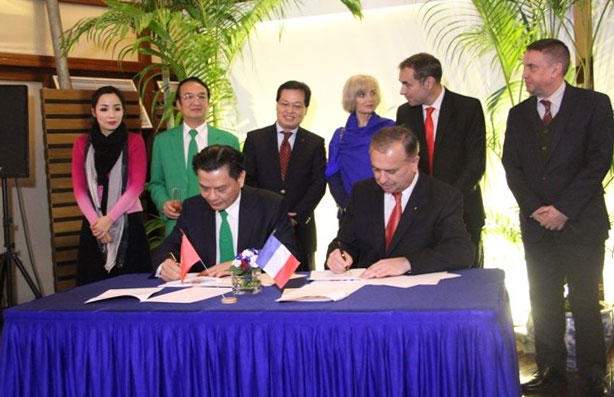Mai Linh asks for government incentives for joint electric car project with Renault

In a document recently submitted to many government agencies, including the ministries of Finance and Transport, Planning and Investment, Natural Resources and Environment, and Science and Technology, Mai Linh proposed a decrease or elimination of tariffs on the importing of electric cars, as well as a decrease in value-added tax, special consumption tax, and many other types of taxes and fees related to electric cars.
Mai Linh also asked for land to build the necessary infrastructure for its project, including parking lots and charging stations.
The company also asked for a loan with an interest rate of 4 per cent per year, valid for 10 years, starting when the project is approved.
Last December, Mai Linh and Auto Motors Vietnam, the exclusive importer of Renault cars in the country, signed a Memorandum of Understanding on the importing of electric cars for passenger transport services. In the pilot phase, about 30 electric cars made by Renault are going to be imported into Vietnam to run in Hanoi, Ho Chi Minh City, and Danang. Within five years, the company is going to replace its current fleet of 14,000 conventional cars.
“It is difficult to carry out this project because the price of an electric taxi is a lot higher than that of a car running on oil, also Vietnam does not yet have the infrastructure for electric cars,” said Ho Huy, chairman of Mai Linh Group.
Ho Huy calculated that the project, including the importing of the cars and the building of charging stations, is going to cost about €500 million ($567 million).
According to him, Mai Linh is more than willing to help other taxi companies import Renault electric cars if they want to. The representatives of Mai Linh and Renault said the two companies had considered assembling the cars in Vietnam, but a concrete plan or exact numbers depend on whether the companies would receive the necessary support from the two governments.
Electric cars are completely new to Vietnam. While in France there are charging stations in public areas, Vietnam has yet to have a single one, making Mai Linh’s project especially ambitious.
Renault cars are not yet popular in Vietnam, where Toyota held a 37 per cent market share in 2015. In January, Xavier Coiffard, general director of Auto Motors Vietnam told VIR that Renault was considering directly manufacturing cars in Vietnam in the medium term, as well as open new dealerships and offer more after-sale services.
What the stars mean:
★ Poor ★ ★ Promising ★★★ Good ★★★★ Very good ★★★★★ Exceptional
Latest News
More News
- 5G and AI to shape next phase of digital economy (December 03, 2025 | 10:25)
- Fly to Con Dao from 0 VND with Vietjet mega promotion (December 02, 2025 | 16:50)
- Tien Phong strives for a greener plastics industry (December 02, 2025 | 09:22)
- Czech enterprises strengthen presence (December 01, 2025 | 18:00)
- New phase launched to support women-led ventures (December 01, 2025 | 15:08)
- Airlines race to patch Airbus A320/A321 fleets (December 01, 2025 | 09:17)
- European expertise to boost Vietnam’s sustainable logistics push (November 29, 2025 | 10:00)
- AkzoNobel: from painting walls to painting the future (November 28, 2025 | 13:31)
- Tien Phong Plastic ready for a new growth cycle (November 28, 2025 | 10:56)
- AEON Vietnam charts ambitious growth path (November 28, 2025 | 10:53)

















 Mobile Version
Mobile Version